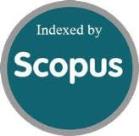Micro-Satellite Configuration of Discoid and Asymmetrical, Gyroless with Thrusters Three-Axis Robust Control and Stability Analysis
Keywords:
H∞ controller, unscented kalman filter, coarse sun sensor, earth horizon sensorAbstract
The center of mass of the micro-satellite can offset due to fuel consumption in the course of propulsion, with the interference of external orbital environment such as gravity gradient torque and solar radiation torque. If the structural shape is discoid and asymmetrical, the attitude control may be difficult. The only solution is to design a robust controller, so that the attitude pointing of the satellite can meet the mission requirements with the interference of internal parameter perturbation and external disturbance. Meanwhile, in order to reduce the weight and manufacturing cost of satellite, in the design of satellite attitude angular rate determination, the project used unscented kalman filter (UKF) algorithm, coarse sun sensor (CSS) and earth horizon sensor (EHS) as measurement components to obtain the satellite attitude without rate gyro.References
P. M. Stoltz, S. Sivapiragasam, and T. Anthony, “Satellite orbit-raising using LQR control with fixed thrusters,” Advances in Astronautical Science, pp. 1-13, AAS 98-007, 1998.
J. R. Wertz, “Spacecraft attitude determination and control,” Kluwer Academic Publishers, 1978.
H. N. Shou and C. T. Lin, “Micro-satellite detumbling mode attitude determination and control: UKF approach,” Storage Management Solutions, no. 5, pp. 35-41, 2011.
H. N. Shou, J. C. Juang, Y. W. Jan, and C. T. Lin, “Quaternion feedback attitude control design: a nonlinear H∞ approach,” Asian Journal of Control, vol. 5, no. 3, pp. 406-411, 2003.
A. Isidori and A. Astolfi, “Disturbance attenuation and H∞-control via measurement feedback in nonlinear systems,” IEEE Transaction on Automatic Control, vol. 37, no. 9, pp. 1283-1293, 1992.
Published
How to Cite
Issue
Section
License
Copyright Notice
Submission of a manuscript implies: that the work described has not been published before that it is not under consideration for publication elsewhere; that if and when the manuscript is accepted for publication. Authors can retain copyright in their articles with no restrictions. Also, author can post the final, peer-reviewed manuscript version (postprint) to any repository or website.

Since Jan. 01, 2019, IJETI will publish new articles with Creative Commons Attribution Non-Commercial License, under Creative Commons Attribution Non-Commercial 4.0 International (CC BY-NC 4.0) License.
The Creative Commons Attribution Non-Commercial (CC-BY-NC) License permits use, distribution and reproduction in any medium, provided the original work is properly cited and is not used for commercial purposes.




.jpg)


